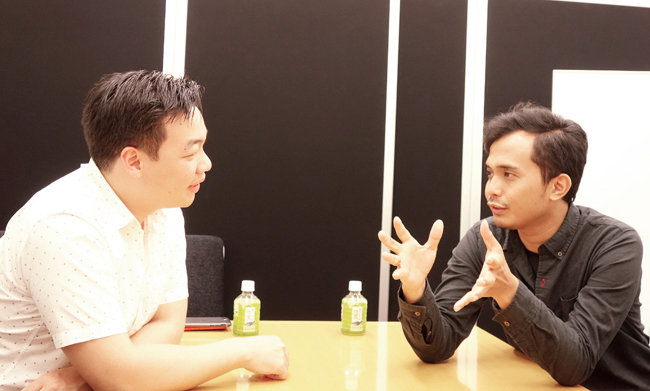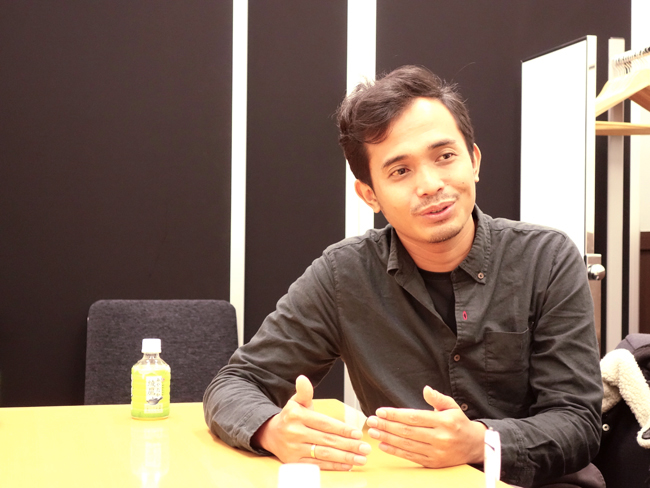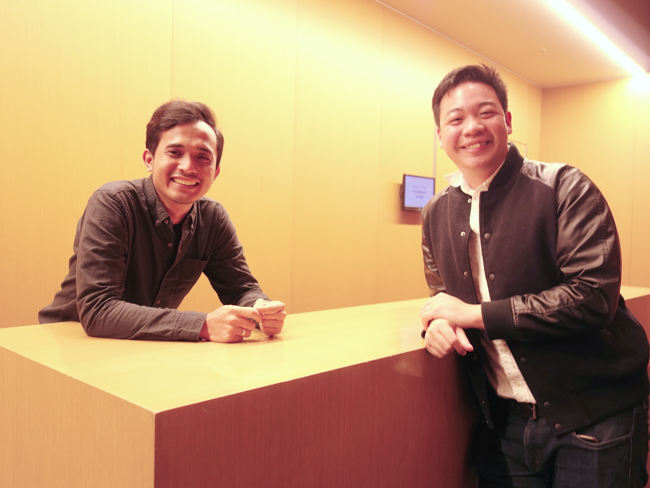How film festivals can nurture new talent
Sekiguchi: Bradley, please tell us about the casting for Motel Acacia. You cast Nicholas Saputra, the Indonesian actor who also appeared in "Variable No.3" (from Asian Three Fold Mirror 2018: Journey) directed by Edwin, as well as Jan Bijvoet, the Belgian actor who appeared in Embrace of the Serpent (2015) which received the Art Cinema Award in the Directors' Fortnight section of the Cannes Film Festival. I would like to ask how you place actors in your films?
Liew: JC Santos playing the main character and other cast were already decided, but the main antagonist played by Nicholas was the last to be cast. My producer Bianca had met Nicholas at the Berlin film festival, and they had wanted to work together. This film is staged in a cold region, so a Filipino actor did not fit the story. As for casting Nicholas, we talked over Skype online and I felt confident that he could play this role. JC (played by JC Santos) and Dawn played by Nicholas are basically the same person. They are the same until the point their lives intersect and part ways as stories about their fathers unfold. The social situation they are in, and their relationship with their respective fathers are different, but as I see it, in the scene where JC and Dawn are facing each other they are essentially seeing themselves in the mirror.
Sekiguchi: Where is the setting?
Liew: The real location is in Slovenia, but the setting is every Western country that has colonized Southeast Asia, including the United States. (laugh)
Sekiguchi: Why the image of a building spreading underground?
Liew: It is like a spaceship underground. I decided on this image after a long discussion with the production designer. Something like a bomb shelter, or a private fallout shelter gaining popularity among the rich nowadays. We imagined a secret hiding space for the super-rich where they exclude immigrants and do other horrible things.

Sekiguchi: What I found interesting in both of your films is that by depicting things happening in the forest or village, not the authority in power at the core of all these problems, you succeed in addressing the bigger issues. Because you don't actually see the enemy in the film, you sense its immensity and eeriness all the more.
Noen: Living under an authoritarian regime is like that. You might not be punished directly by the government, but you must live in that stifling environment. You feel watched by your neighbors and start to have delusions, and instead of investigating the invisible enemy, you lose sight of the truth and of your real enemy.
Liew: The question is how tremendous forces, or "formidable enemies" such as dictators or tyrants, control society. They control by fear. By getting people to follow their "fear". People will hurt others out of fear that they may be punished or that bad things may happen to them. And when this happens, the tyrants don't even need to give you a knife to kill each other. Blinded by suspicion and mistrust, you will find your own knife and start to hurt your friends. The tyrant may live many miles away, but you still feel his presence. That is because the "fear" that he implanted in your society is everywhere. We are controlled by "fear". I did not visually depict the enemy in my film, because I wanted the audience to sense this fact.
Sekiguchi: In terms of your film backgrounds, both of you have joined many pitching platforms or educational programs like the Asian Film Academy and have received funding from international film festivals. I would like your comments on what would be an ideal space or place for filmmakers to receive such support in the future?
Noen: I met a programmer of TIFF in Cannes this May, and although she was interested in showing my new film, it was not possible because it received a grant from the Busan International Film Festival and was already scheduled to be screened in Busan. Receiving production grants from film festivals is important, not only for the fund but for gaining access to screens to present the completed work. It gives you opportunities to present your work as well as to network with people in the film industry.
The other day, I participated in a scriptwriting workshop in Jakarta organized by a former member of "TorinoFilmLab". In these workshops, others can bring fresh ideas to where you might have been feeling stuck. It is a wonderful process to spend time together to exchange ideas. I think labs for scriptwriting and for training producers are very helpful.

Liew: Besides those, I think we should have more workshops on creative producing, to study how to produce films differently from the typical process. Many people aspire to become directors or writers, and there are many training programs for them, too. But there are few such programs for producers. In our region, "producers" are thought to be people who just bring money. But I believe producers are people who start the project with the director, work together on the script from scratch, shoot the film, complete and distribute it, and then pave the way for the director's next film, all in partnership with the director. It would be good to have a program that trains producers like that.
There are workshops like "TIES THAT BIND" organized by European Audiovisual Entrepreneurs (EAVE)*2 and "SEAFIC lab" in Thailand that have training programs for producers. Producers play an essential role in improving the quality of the film as it is imagined by the director and making it happen. An ideal program will be where a creative producer with a lot of experience in international co-production or in film festivals works with an emerging director preparing his first feature, a first-time scriptwriter, and a first-time producer to jointly produce a film.
There are programs for directors to meet and exchange ideas with other directors, and likewise for writers. By having a creative producer join, they can receive feedback on specific contents, consider how to expand their project internationally, and so on. The role of the creative producer is to oversee the entire project from a bird's-eye view and to help make a better film. For directors and scriptwriters, a film project can be a very personal thing. As a result, some may be hurt emotionally by simple advice, or others may have passionate ideas locked up inside of them. With a creative producer joining them and guiding them like a parent would, chances are that a good film will be produced at the end. I often think about this, as I see a lot of promising proposals in film markets and pitching platforms, but very few of these films are actually completed.
*2 European Audiovisual Entrepreneurs(EAVE)is a professional training organization for audiovisual producers founded by the EU in 1988.
European Audiovisual Entrepreneurs Official Website

[On November 1, 2019 at Roppongi Academy Hills]
Interviewer: Yuko Sekiguchi
Born in 1964. Formerly the chief editor of the Japanese film magazine Kinema Junpo and the chief editor of Variety Japan, the Japanese version of the American entertainment magazine Variety, Sekiguchi is currently a freelance writer, editor and consultant. Her hobby is to take walks around historical sites.
Edited and photographed by Izumi Kakeya (Japan Foundation Asia Center)
Related articles
Motel Acacia
Science of Fictions






